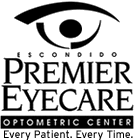Many eye diseases are associated with aging, and even before you notice any problems, it is common for one of these conditions to be detected during a comprehensive eye exam. If you were diagnosed with an eye disease, such as cataracts, glaucoma, macular degeneration, diabetic retinopathy, or dry eye, you may be overwhelmed by the diagnosis and confused about what happens next.
Will you need medications or surgery – now or in the future? Our Escondido eye clinic has prepared the following answers to your questions about eye disease.
I have a cataract. Do I need cataract surgery and when?
Cataracts develop and grow slowly, and it is common for people to miss the early symptoms of this eye disease. Yet, as the cataract grows it will begin to affect your vision. In the beginning, the effects are generally mild and cataracts require no treatment. You may find it helpful to wear anti-glare glasses and sunglasses and read or work under brighter lighting conditions. But once they start to interfere with your vision, it is time to discuss cataract treatment with your eye doctor. Cataract surgery to remove the cloudy lens from your eye is the gold standard for treatment and has a very high success rate.
My glaucoma pressure levels are high. What type of glaucoma treatment will I need?
Elevated levels of the fluid in your eye is the primary sign of glaucoma, although your eye doctor will need to perform a thorough eye exam to confirm the diagnosis. Even though glaucoma doesn’t usually present symptoms at the beginning, it is essential to begin treatment as early as possible!
There are two types of glaucoma, “open angle” and “angle closure.”
The second form, angle-closure, requires immediate medical treatment because it can damage your vision very quickly. The main goal of glaucoma treatment for both types is to lower or stabilize your intraocular pressure. Reducing the pressure level is the best way to prevent damage to your optic nerve. In general, prescription eye drops are frontline treatment. However, if glaucoma progresses, your eye doctor may recommend other treatments, such as pills, laser procedures, conventional surgery, or a combination of the above.
I have symptoms of macular degeneration. Is there treatment for my eye disease?
There are two kinds of macular degeneration, and the treatment depends on which type you have. Dry macular degeneration, which progresses more slowly, usually causes less severe damage to your vision. In the beginning, treatment may involve taking high doses of antioxidants and zinc, as well as a specific combination of vitamins and minerals. If you have wet macular degeneration (the more serious type), treatment may consist of injections directly into your eye, which works to suppress the growth of leaky, abnormal blood vessels. Laser therapy is another promising treatment.
My last dilated eye exam showed I have leaky blood vessels from diabetic retinopathy. Do I need laser surgery?
If you have nonproliferative retinopathy, then there may be no need for any immediate treatment. You will just need to visit your eye doctor regularly for eye exams to keep a close watch on the condition of your eyes. It is also important to control blood glucose levels tightly, (according to your physician’s recommendations), as studies show that controlling diabetes can significantly slow or halt the progression of retinopathy.
If you have proliferative retinopathy, you will likely need surgery, such as focal laser surgery. This outpatient procedure can help prevent vision loss. Other possible procedures include laser scatter surgery to get rid of abnormal blood vessels or a vitrectomy to replace the inner gel of your eye.
My dry eyes hurt! What can be done?
The symptoms of dry eye can be painful and get in the way of doing many things, such as reading or watching TV. In order to design the most helpful treatment for your unique condition, you will need a comprehensive eye exam that uncovers the root of the problem. Depending on what’s causing your dry eyes, treatment can be as simple as topical therapy, such as eye drops. Other options include artificial tear inserts, hydration masks, antibiotics, or punctal plugs that block tear drainage and help to disperse your tears over the eye surface. Treatment for dry eye is highly personalized – what works for one patient may not help another, and you need an experienced eye doctor to custom-design the best therapy to give you comfortable vision once again!
For a precise diagnosis of eye disease and advanced treatments, call our Escondido eye doctor at Escondido Premier Eyecare, Call 760-300-3120 or Click her to make an appointment online!
Escondido Premier Eyecare, 1299 East Pennsylvania Avenue, Suite B, Escondido, California, 92027. serving San Marcos, and the surrounding areas.



*Closed daily for lunch between 1pm to 2pm